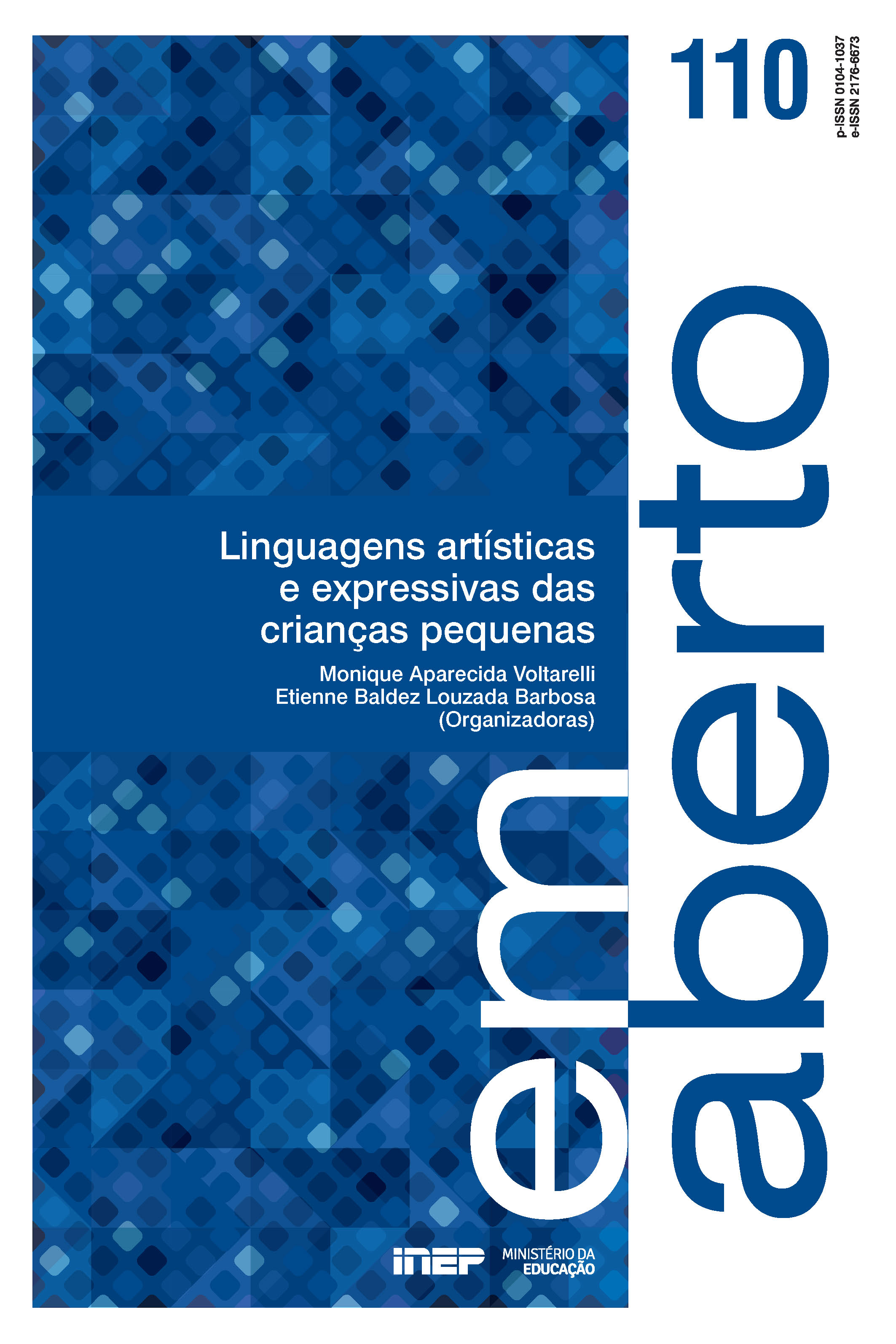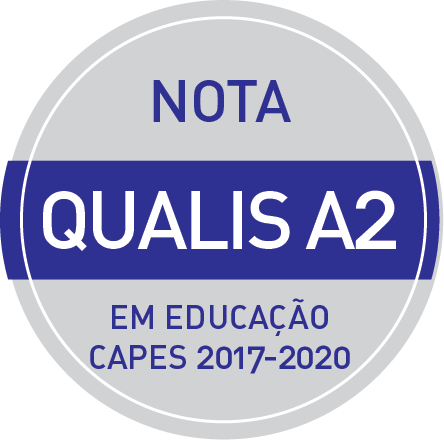Coros infantis comunitários em instituições educativas e seu papel no desenvolvimento artístico, pessoal e social das crianças envolvidas
Resumo
O objetivo do canto coral, aliás, da educação musical, é contribuir para o crescimento pessoal e para a capacidade de fruição da música, desenvolvendo a musicalidade nas crianças. Para isso, é necessário que o professor promova desafios musicais significativos para elas, assim como a capacidade de realizá-los. Sendo o canto coral uma atividade musical, mas também corporal, transforma o corpo, em especial a voz, em um instrumento musical. Como prática de acesso simples, exige poucos recursos além do material humano, sendo capaz de mover emoções, imaginação e afetos dos que cantam e dos ouvintes. Na prática coral infantil em escolas, a componente lúdica como fundamental, portanto, os profissionais devem procurar qualidade pedagógica e didática, indo ao encontro dos gostos e das práticas musicais das crianças, não descurando a imaginação e a criatividade. Defende-se que a educação vocal esteja nas mãos de profissionais que privilegiem a atenção pessoal e o apoio emocional e promovam a capacidade nas crianças de definir uma linha de conduta de abertura à diferença, de curiosidade, de permanente descoberta e crescimento.
Downloads
Referências
AMATO, R. de C. F. Música e políticas socioculturais: a contribuição do canto coral para a inclusão social. Opus, Pelotas, v. 15, n. 1, p. 91-109, jun. 2009. Disponível em: <http://www.anppom.com.br/revista/index.php/opus/article/view/264/244>.
AMATO, R. de C. F. O canto coral como prática sócio-cultural e educativo-musical. Opus, Pelotas, v. 13, n. 1, p. 75-96, jun. 2007. Disponível em: <http://www.anppom.com.br/revista/index.php/opus/article/view/295/273
ARSLAN, A. A study into the effects of art education on children at the socialisation process. Procedia: Social and Behavioral Sciences [online], v. 116, 4114-4118, Feb. 2014.
ASPRILLA, L. I. Educar en la música: una aproximación crítica al talento y la educación musical. Aula, Salamanca, v. 21, p. 63-83, 2015.
BAILEY, B. A.; DAVIDSON, J. W. Amateur group singing as a therapeutic instrument. Nordic Journal of Music Therapy [online], 12, n. 1, p. 18-32, 2003. Disponível em: <https://doi.org/10.1080/08098130309478070>. Acesso em: 12 abr. 2021.
BARTHES, R. Image-music-text. Great Britain: Macmillan, 1978.
BARTLE, J. A. Sound advice: becoming a better children’s choir conductor. Oxford: Oxford University Press, 2003.
BOAL-PALHEIROS, G. Som da Rua, um projecto musical de intervenção social. In: CONGRESSO INTERNACIONAL PEDAGOGIA SOCIAL, 27., 2014, Porto. Anais... Porto: Escola Superior de Educação do Instituto Politécnico do Porto, 2014. p. 378-385.
BOAL-PALHEIROS, G. Singing against loneliness: songs of a homeless choir in Porto. Music and Arts in Action, London, v. 6, n. 1, p. 63-79, Jan. 2017.
BOURDIEU, P. A distinção: uma crítica social da faculdade do juízo. Coimbra: Edições 70, 2010.
CALVI, J.; SOUZA, R.; SANTINI, R. A organização do consumo de música na internet através da classificação do gosto cultural: estudo de caso do sistema de recomendação last.fm. In: CONGRESO ISKO-ESPANÃ, 9., 2009, Valencia. Actas... Valencia: International Society for Knowledge Organization, 2009. p. 663-675. Disponível em: <https://dialnet.unirioja.es/servlet/articulo?codigo=2924551>. Acesso em: 12 abr. 2021.
CAMPBELL, P. Musical meaning in children’s cultures. In: BRESLER, L. International handbook of research in arts education. Dordrecht: Springer Netherlands, 2007. p. 881-897.
CARDOSO, F. A improvisação vocal como ferramenta para as aulas de Educação Musical. Revista de educação musical, Lisboa, v. 137, n. 5, p. 26-34, out. 2011.
CARMINATTI, J. S.; KRUG, J. da S. A prática de canto coral e o desenvolvimento de habilidades sociais. Pensamiento psicológico, Cali, Colombia, v. 7, n. 14, p. 81- 96, 2010. Disponível em: <https://dialnet.unirioja.es/descarga/articulo/3265166. pdf>. Acesso em: 12 abr. 2021.
COLEMAN, J. Social capital in the creation of human capital. American Journal of Sociology, Chicago, v. 94, p. S95–S120, July 1988. Suplement. Disponível em: <https://doi.org/10.1086/228943> Acesso em: 12 abr. 2021.
CORTESÃO COSTA, I. Processos e resultados percebidos sobre a participação em projetos de música coral comunitária com crianças: “...e gostamos de estar à beira dos nossos colegas, a cantar todos juntos!”. 2020. Tese (Doutoramento em Psicologia) – Faculdade de Psicologia e de Ciência da Educação, Universidade do Porto, Porto, 2020. Disponível em: <https://hdl.handle.net/10216/126170>. Acesso em: 12 abr. 2021.
CORVELO, J. G. O coro como veículo de socialização e educação musical: o caso do Coro Comunitário de Amarante. 2013. Dissertação (Mestrado em Música) – Departamento de Comunicação e Arte, Universidade de Aveiro, Aveiro, 2013. Disponível em: <https://ria.ua.pt/bitstream/10773/12173/1/ Disserta%C3%A7%C3%A3o.pdf>. Acesso em: 12 abr. 2021.
DAKON, J. M.; CLOETE, E. The Violet experience: social interaction through eclectic music learning practices. British Journal of Music Education, Cambridge, v. 35, n. 1, p. 57-72, 2018.
FERNANDEZ, O. O canto coral nas escolas. Illustração Musical: Revista Mensal de Cultura e Informações Musicaes, Rio de Janeiro, p. 67-68, mar. 1931. Disponível em: <https://lorenzofernandez.org/o-canto-coral/>. Acesso em: 12 abr. 2021.
FINNÄS, L. How can musical preferences be modified?: a research review. Bulletin of the Council for Research in Music Education, University of Illinois, Urbana-Champaing, n. 102, p. 1-58, 1989.
FREER, P. K. The performance-pedagogy paradox in choral music teaching. Philosophy of Music Education Review, New York, v. 19, n. 2, p. 164-178, 2011. Disponível em: <10.2979/philmusieducrevi.19.2.164>. Acesso em: 12 abr. 2021.
FREGA, A. L. Metodología comparada de la educación musical. 1994. 355 f. Tesis (Doctorado en Música) – Facultad de Humanidades y Artes, Universidad Nacional de Rosario, Buenos Aires, 1994. Disponível em:<http://www.analuciafrega.com.ar/index.php/publicaciones/libros/102-metodologia-comparada-de-la-educacion-musical>. Acesso em: 12 abr. 2021.
HEDDEN, D. An overview of existing research about children’s singing and the implications for teaching children to sing. Update: Applications of Research in Music Education, v. 30, n. 2, p. 52-62, Feb. 2012.
HOULAHAN, M.; TACKA, P. Kodály today: a cognitive approach to elementary music education. Oxford: Oxford University Press, 2015.
KOOPMAN, C. Community music as music education: on the educational potential of community music. International Journal of Music Education [online], v. 25, n. 2, p. 151-163, Aug. 2007. Disponível em: <https://doi.org/10.1177/0255761407079951>. Acesso em: 12 abr. 2021.
LANGSTON, T. W.; BARRETT, M. S. Capitalizing on community music: a case study of the manifestation of social capital in a community choir. Research Studies in Music Education, Victoria, AU, v. 30, n. 2, p. 118-138, 2008.
MENEZES, I. Intervenção comunitária: uma perspectiva psicológica. Porto: Legis, 2007.
MOURA, M. L. de. Projectos artístico-musicais: o contributo do ensino não formal para o desempenho académico e para a consideração das competências musicais no segundo ciclo do Ensino Básico. 2013. 273 p. Tese (Doutoramento em Música) – Escola das Artes, Universidade Católica Portuguesa, Porto, 2013. Disponível em: <http://hdl.handle.net/10400.14/12583>. Acesso em: 12 abr. 2021.
NUNES, M. O mito no rádio: a voz e os signos de renovação periódica. São Paulo: Annablume, 1993.
RAO, D. The children’s chorus: instrument of artistic excellence. The Choral Journal, New York, v. 20, n. 7, p. 5-6, Mar. 1980.
RAO, D. Children’s choirs: a revolution from within: Doreen Rao looks at choral singing as an opportunity for elementary students to develop musicianship, participate in culture, and realize the benefits of self-esteem. Music Educators Journal, v. 80, n. 3, p. 44-48, Nov. 1993. Disponível em: <https://doi.org/10.2307/3398675>. Acesso em: 12 abr. 2021.
RAO, D. Singing in the twenty-first century... singing a better world. In: THE PHENOMENON OF SINGING INTERNATIONAL SYMPOSION, 5., 2005, Newfoundland and Labrador. Procedings... Newfoundland and Labrador: Memorial University of Newfoundland, 2005. p. 248-256. Disponível em: <https://journals.library.mun.ca/ojs/index.php/singing/article/view/610/446>. Acesso em: 12 abr. 2021.
RODRIGUES, H.; MARINHO, T. Caracterização do panorama coral infantil e juvenil do distrito de Lisboa no ano de 2017. Music for and by Children Journal, Aveiro, v. 1, n. 1, Oct. 2017. p. 1-18.
RUIZ, J.; VIEIRA, M. H. Cantem, como se estivessem num prado verde, com ar fresco no rosto...: imagética e metáfora na pedagogia coral infantil. Revista E-Psi: Revista Eletrónica de Psicologia, Educação e Saúde, online, n. 7, p. 3- 17, 2017. Suplemento 1. Volume Especial: Estudos da Criança. Disponível em: <https://revistaepsi.com/wp-content/uploads/artigos/2017/2017-VolumeEspecial-Estudos- da-Crianca1.pdf>. Acesso em: 12 abr. 2021.
SCHAFER, R. M. O ouvido pensante. São Paulo: Editora da Universidade Paulista, 2012.
SEIXAS, A. M. da C. V. Cantar em coro: estudo de caso de uma área do Norte Litoral de Portugal. 2013. 297 p. Tese (Doutoramento em Música) – Escola das Artes, Universidade Católica Portuguesa, Porto, 2014. Disponível em: <http://hdl.handle.net/10400.14/14904>. Acesso em: 12 abr. 2021.
SHELEMAY, K. K. Musical communities: Rethinking the collective in music. Journal of the American Musicological Society, California, v. 64, n. 2, p. 349-390, 2011.
SHIOBARA, M. Collaborative learning in community music activity: enhancing musical and personal lives. In: COHEN, M. L. (Ed.). CMA XIV: listening to the world: experiencing and connecting the knowledge from community music. Salvador, Brasil: International Society for Music Education (ISME), 2014. p. 11-15. Disponível em: <https://www.isme.org/sites/default/files/documents/proceedings/ CMA%20XIV_Full_Proceedings_FINAL_MC.pdf>. Acesso em: 12 abr. 2021.
SKELTON, K. D. The child’s voice: a closer look at pedagogy and science. Journal of Singing, [online], v. 63, n. 5, p. 537-544, May/June 2007.
SMITH, B.; SATALOFF, R. T. Choral pedagogy and the older singer. San Diego: Plural Publishing, 2013.
SPENCER, H. The origin and function of music. In: SHEPHERD, J.; DEVINE, K. (Ed.). The routledge reader on the sociology of music. New York: Routledge, 2015. p. 27-33.
SWANWICK, K.; LAWSON, D. “Authentic” music and its effect on the attitudes and musical development of secondary school students. Music Education Research, [online], v. 1, n. 1, p. 47–60, 1999. Disponível em: <https://doi.org/10.1080/1461380990010105>. Acesso em: 12 abr. 2021.
TITZE, I. R. The human voice as a biological musical instrument. In: SUNDBERG, J.; NORD, L.; CARLSON, R. Music, language, speech and brain. London: Springer, 1991. p. 232-242
TOLBERT, E. The enigma of music, the voice of reason: “music, language”, and becoming human. New Literary History, [online], v. 32, n. 3, p. 451-465, 2001.
TONNEIJCK, H.; KINÉBANIAN, A.; JOSEPHSSON, S. An exploration of choir singing: achieving wholeness through challenge. Journal of Occupational Science [online], v. 15, n. 3, p. 173-180, 2008. Disponível em: <https://doi.org/10.1080/14427591.2008.9686627>. Acesso em: 12 abr. 2021.
TURINO, T. Music as social life: the politics of participation. Chicago: University of Chicago Press, 2008.
Copyright (c) 2021 Em Aberto

This work is licensed under a Creative Commons Attribution-NonCommercial 4.0 International License.
A aceitação do texto implica automaticamente a cessão de seus direitos autorais ao Inep.
A revista Em Aberto adota a licença CC-BY.
A reprodução total ou parcial dos textos da revista é permitida desde que citada a fonte de publicação original e o link para a licença CC BY 4.0 e que sejam indicadas eventuais alterações no texto.













